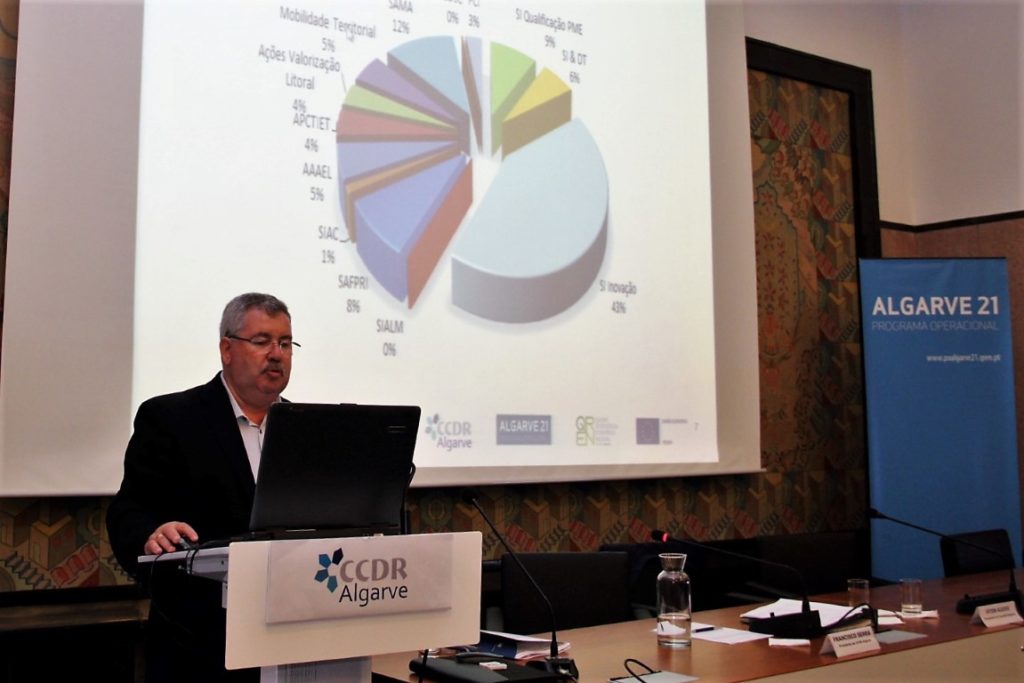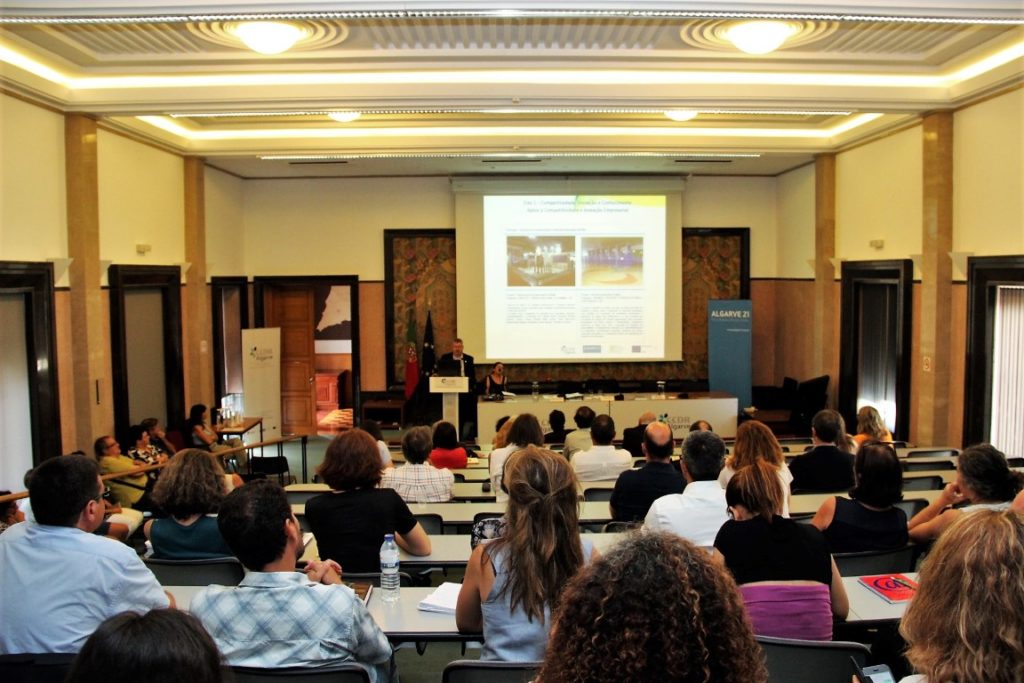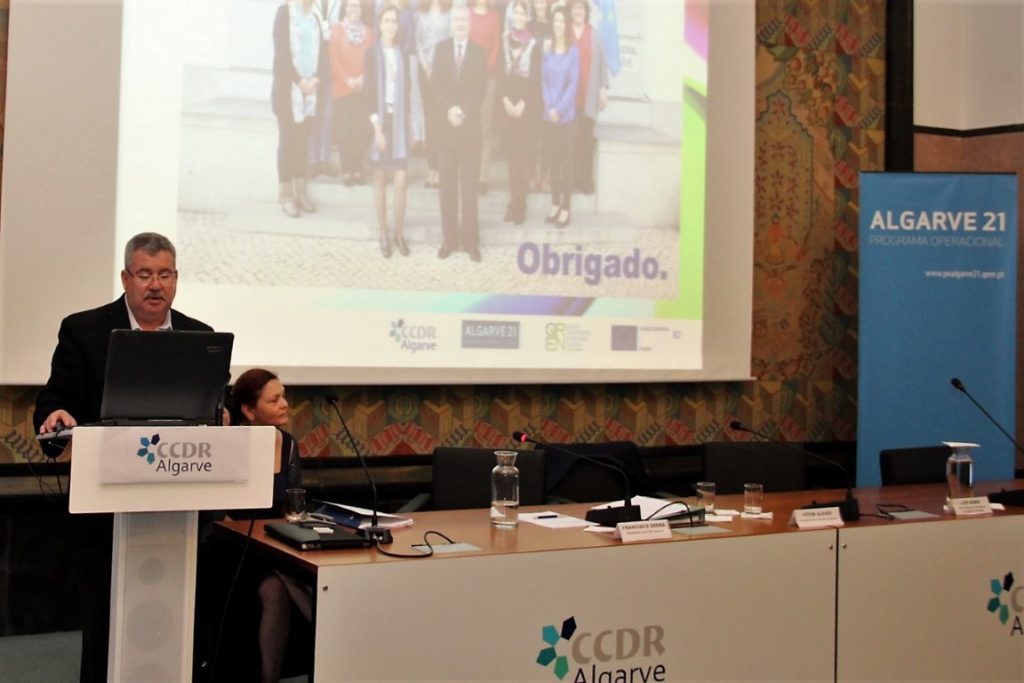 «Not being euphoric, we are pleased to inform you that what was done in the Algarve 21 Operational Program could hardly have been done better», said the chairman of the Algarve Regional Coordination and Development Commission Francisco Serra, during the closing session of the program that framed the distribution of European Union Funds in the Algarve region during the QREN (2007 and 2013), which took place yesterday, the 20th of June. The execution of the total amount made available by the EU to the Algarve was the key point of the balance, but it was not the only positive aspect.
«Not being euphoric, we are pleased to inform you that what was done in the Algarve 21 Operational Program could hardly have been done better», said the chairman of the Algarve Regional Coordination and Development Commission Francisco Serra, during the closing session of the program that framed the distribution of European Union Funds in the Algarve region during the QREN (2007 and 2013), which took place yesterday, the 20th of June. The execution of the total amount made available by the EU to the Algarve was the key point of the balance, but it was not the only positive aspect.
The Algarve did well to take advantage of the European funds that came to it in the previous Community Support Framework, although there were three reprogramming and the renegotiation of the contribution rates, in order to increase them to a final average of more than 51 percent. What is certain is that, with the “leverage” of funds that came from Europe, it was possible to carry out investments with a global value of 339 million euros, most of them by private entities.
The weight of private initiative among the 584 operations approved in PO Algarve 21 was, moreover, one of the issues highlighted by Francisco Serra, during the closing session of the Operational Programme. The president of the Algarve CCDR recalled that it is often pointed out that European Union Funds are mostly channeled to the public sector, something that, he assured, did not happen in the National Strategic Reference Framework (QREN) 2007-13, in the Algarve. It even assures that there was “a great primacy of private sector investment, mainly in Axis 1 [Competitiveness, Innovation and Knowledge]”.

In the assessment made, which was revealed at the session, more than two thirds of the beneficiaries of this axis – which was the one with the largest allocation of ERDF funds, of 88 million euros – were private entities. In the other lines, «more oriented to public entities», the weight of private companies is smaller, but in some cases already relevant.
According to Francisco Serra, the sectors that showed more dynamism to take advantage of the (few) available funds were tourism and innovation, but “there was also a lot of urban renewal and rehabilitation and reorganization of the coastline”. By municipalities, Loulé and Faro they were the ones that received the most funds (over 15 million euros in contributions), followed by Tavira and Portimão.
As for concrete projects, Francisco Serra highlighted the construction of 17 school centers, which benefited 4916 students in the region, and the technological equipment of Basic Schools in the Algarve.
The president of CCDR do Algarve took the opportunity to praise the team that worked on the projects, something he considered "elementary justice". "They were tireless," he summed up. Compliments that, he assured, are not made for his own cause, as he has only held the position for less than a year. “My contribution was to look at the reports, see that everything was fine and sign (laughs),” he said.

On a more serious note, Francisco Serra relativized the impact of this OP for regional development. “We have to be aware that an operational program like the one that has now formally closed, with a global value of 175 million euros in ERDF direct funding, is of a relatively modest dimension in the set of public and private investments in the region”, he considered.
In other words, «the regional development indicators do not result in a very high degree of dependence on what was the Algarve 21 Operational Program». This does not mean that they have not been important, especially in some areas, such as job creation and environmental interventions.
«The European Union Funds, which are public, are very focused on leveraging certain types of projects. For example, if we want to develop the interior or if we want to support a certain type of activity where there is potential, but there is no dynamism», he explained.
In many cases, they are directed to public entities, but in others, such as the Incentive System, to which a good part of the budget of PO Algarve 21 was channeled, they are destined to private entities, as long as they "fulfill public policy objectives" , which in the present case involved job creation.
“From this point of view, it can be said that the impact is quite significant. 20 million euros for a system of incentives for development and employment in low-density territories can have a very big meaning», he considered.
The PO Algarve 21 has officially ended, attention is focused on CRESC Algarve 2020. For now, Francisco Serra is prudent and does not point to perspectives, the only exercise he could do now, at a time when a good part of the financial instruments that will be made available to the region.

















Comments